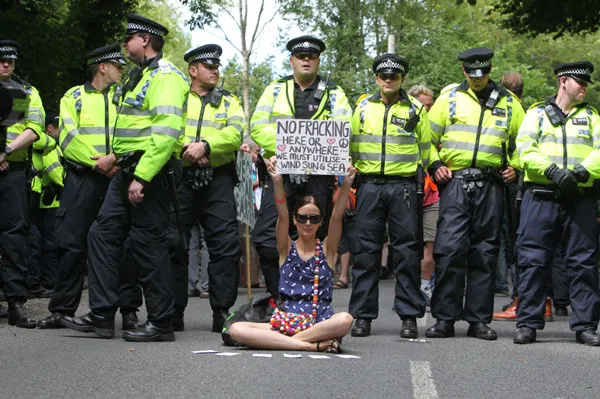If you’re going to visit the House of Commons for the first time, 5 November is an auspicious day. Well, so thought Guy Fawkes, but I come with peaceful intentions. I’m meeting the energy minister Andrea Leadsom in her state office and after a bit of a wait in mighty Westminster Hall, I’m led in.
She’s friendly but when I sit down to face her, I’m more than aware of the four advisors and assistants from the Department of Energy and Climate Change (DECC) sitting directly behind me in the tiny office.
I’ve been invited to hear more detail about the Government’s plans for fracking in England and Wales (Scotland has made its own mind up – it say “no”). The debate over the pros and cons of hydraulic fracturing for gas has already generated enough heat to power a small city (see December issue). So why is the Government is so enthusiastic about this controversial fossil fuel as a new source of energy?
Economic potential
“We believe it has the potential to be worth £30bn to the UK economy and create 60,000 jobs,” replies Leadsom. “And I urge people to give it a chance to see whether it is viable.”
I ask just how much gas can be extracted economically and how useful it will be to our overall energy needs. “We think home-grown gas could provide a major contribution for two decades. At the moment we’re still highly dependent on coal. You cannot simply move to renewables because of the nature of intermittency. When the wind doesn’t blow, it puts stresses on the grid. Then we have to turn to coal, gas and diesel. We can’t do without the secure baseload. Shale gas is the greenest fossil fuel and can provide a bridge to a low-carbon future.”
The minister brings up another concern – energy security and how a home-grown gas industry can wean us off relying on Russian or Middle Eastern supplies. Understandable – but it begs the question as to why the Government would welcome investment in our nuclear industry from communist China.
Leadsom replies: “The UK has an open economy and welcomes inward investment but this does not give foreign investors any control. Plus, British bill payers and consumers will not contribute a thing until electricity comes on line.”
I’ll come back to the arguments about fracking versus renewables, particularly in light of the Government’s policy towards solar and onshore wind and the threat of climate change. However, for many people, especially rural communities, the most pressing worry is whether fracking wells will blight villages, beloved landscapes and environmentally sensitive areas.
“National Parks are safe”
A day before my interview, Andrea Leadsom had announced a six-week consultation on where fracking can take place, especially surface drilling. So which areas will be protected?
The minister is clear: “There will be no surface drilling in current protected areas, such as National Parks, NNRs, SSSIs and AONBs.” I press her on this and she reiterates that: “We can rule out that fracking will occur in sensitive areas. But it’s worth bearing in mind that we have had a successful onshore oil and gas sector for 50 years in places like Lancashire and it’s very discreet.”
Leadsom insists local concerns will be taken into consideration. “We want to make sure that we meet the fears of local communities by addressing them head on. We’re trying to take every step we can to reassure local people that this is not going to be something that damages their community life. Visual impact will be paramount.”
But there is a caveat: what about gas exploration underneath sensitive areas? “The regulations allow drilling under National Parks – but they stipulate that drilling cannot occur closer to the surface than 1.2km [beneath sensitive areas].” She is also keen to scotch suggestions that fracking will be allowed in water catchment areas. “In a protected ground water area, drilling will not be permitted higher than 1.2km. Almost all drinking water is at 400m or higher. So there should be 800m of buffer.”
No earthquakes
But who will do the regulating? In some areas of public life, such as with the press or with pesticide regulation, there is self-policing, which has proved controversial. The minister assures me that this will be the responsibility of the Environment Agency (EA) and the Health and Safety Executive (HSE). “Each site will have an environmental inspection by EA while HSE will look at the safety of the well itself. It will have the tightest regulation in the world.”
“In terms of the chemicals used in the fracking process, the EA will inspect them and publish their finding on their website.”
The minister acknowledges that there were some horror stories from the US in the early days of shale exploration there – with chemical leaks, seismic activity and waste gases escaping. There is no chance of that happening here, she says.
“There won’t be earthquakes, the seismic action will be the equivalent of slamming a door. We won’t feel it.”
So the minister says that fracking will be safe and will not despoil areas of the countryside. But her department is that for Energy and Climate Change and there seems to be a massive contradiction in its current message. Fossil fuels, including shale gas and oil, contribute towards climate change and all climate scientists are urging governments to invest in renewables instead of coal, oil and gas in order to avoid potentially catastrophic global change. Days after my interview, the Met Office released data showing that 2015 would be the first year to see global temperatures 1°C above the pre-industrial average. Climate scientists say a 2°C rise is “the gateway for dangerous warming”.
So I ask why the Government is championing fracking while at the same time suddenly removing financial and political support – and thus reducing investor confidence – in onshore wind power, solar, low energy homes and the Green Bank. Solar companies have started laying off staff after subsidy cuts of 87% were announced last October and two firms have gone bust.
“You can’t generate gas for a gas boiler from wind or solar. You can’t move away from a reliance on gas,” says Leadsom.
“Clearly we’ve been enormously successful from a slow start in building a renewable sector. For example, the UK accounts for half the world’s off shore wind – a huge success story.
“Solar exceeded enormously our own expectations – but this comes with a cost because deployment of renewables is subsidised by all of us and by all UK businesses in their energy bills. We’ve had to rein in the subsidies to protect businesses and households from excessive costs.” The underlying message is that economy comes first.
I mention the solar companies’ claim that the “self-proclaimed party of business” is killing a burgeoning part of the economy.
“We don’t want a sector that just survives on taxpayers’ help. We need to focus on marine and tidal and others, so that we’re sharing the available subsidy among technologies,” says Leadsom. I ask whether there is a subsidy for these other technologies.
“We’re waiting for projects to come forward,” is the answer. So not yet.
The UN is not impressed and its chief environment scientist recently said: “What’s disappointing is when we see countries such as the United Kingdom that have really been in the lead in terms of getting their renewable energy up and going, we see subsidies being withdrawn and the fossil fuel industry being enhanced.”
This is compounded a week later when Andrea Leadsom’s boss, energy secretary Amber Rudd, told the Commons Energy and Climate Change Committee: “It’s my aim we should meet the 2020 target [15% of energy needs supplied by renewables]. I recognise that we don’t have the right policies, particularly in transport and heat, but we have four to five years and I am committed to making the target.”
Andrea Leadsom sums up her position: “Fracking for shale gas is our way of solving the trilemma of energy security, keeping bills down and moving to a cleaner energy future.”
I slip in a final question: if there was a viable shale gas deposit, would she support fracking in her bucolic home constituency of South Northants?
“If there were a viable field there,” she responds. “It’s a very viable proposition for the entire country.”

Photo credit: iStock
But this approach is unlikely to placate the growing numbers demanding drastic action on climate change. Expect fireworks.

